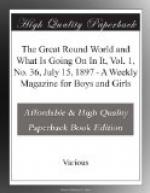Mindful of Huxley’s definition of culture, that it “must consist of criticism and comparison,” Mrs. Parmele sweeps away all secondary details, all the less important incidents, and proceeds to her narrative of Columbus’s discovery, the colonial period, the founding of our Republic, and its subsequent life down to the present year, with the simple directness of a dramatist; there is no halting in her impetuous relation; it is infused throughout with the same degree of philosophical ardor, and one follows as one does a wonder tale the rapid sequence of events, tracing with an awakened interest the national issues, which, presented in this new, concise, imaginative way, take on a fresh, an enchanting charm. Nothing could be clearer to the mind of a child eager to know the reason of things, nor to that of a grown person, fatigued by the jostling memories of both important and useless events, than this return to the fundamental, the philosophical, the moral causes which underlie the life of the Republic. The tortuous channels by which the currents bore us into the war of 1812 are described with such surprising simplicity that one almost fails to realize how admirable a piece of condensation the single chapter is; and the annexation of Texas is told with equal precision. The earliest traces of our present policies, such as the Monroe Doctrine, the protective tariff and free-silver issues, are explained so clearly and impartially that the author’s brevity helps rather than mars the effect upon the mind.
“The history of America should be an inspiration, not a task. It ought to be known in its grand, simple lines by every child in the nation. Let it be so acquired first in its utmost brevity, then enlarged, and enlarged, and again, gradually approaching to a nearer view of the multiplicity of detail. Pleased at finding new truths which fit precisely into those already familiar, there will be no difficulty in keeping alive the interest, nor in remembering. It will be grafting on to the living, not on to the dead.” This is good advice, and Mrs. Parmele proves it may make good reading as well.—Republican, Springfield, Mass.




